By Wu Tingyao

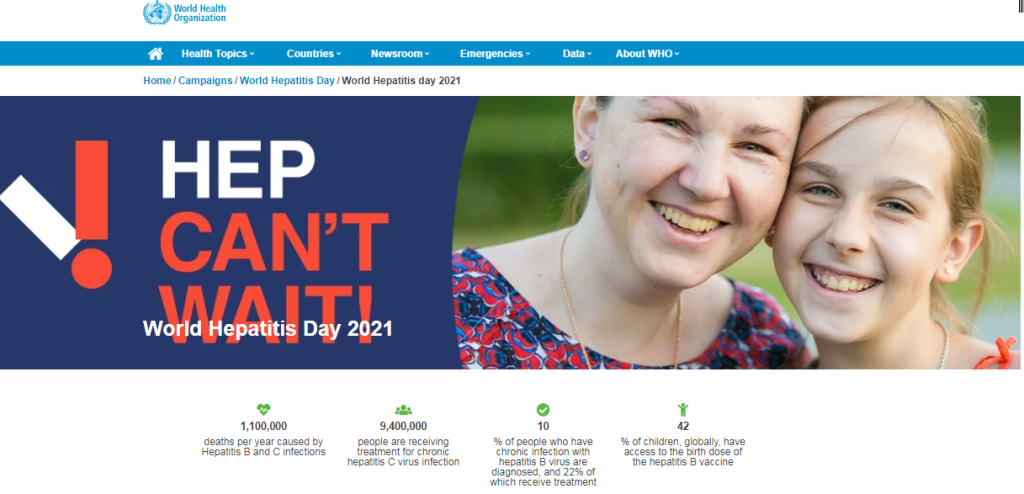
If it weren’t for the reminder of World Hepatitis Day, we might only pay attention to guard against the novel coronavirus and forget that there are hepatitis viruses lurking in the dark.
Just because the hepatitis virus does not make us hard to breathe and force us to be hospitalized like the novel coronavirus, we often ignore it, but this does not mean that it will forget us. In the long years, the hepatitis virus will take advantage of low immunity to push us from hepatitis step by step to the abyss of liver cirrhosis, liver failure or liver cancer.
The origin of World Hepatitis Day
When a disease must be set by the World Health Organization as a “World Day” to promote the importance of prevention and treatment to all mankind, it often means that the severity of the disease is not understood by the common people.
In order to increase people’s attention to the prevention and treatment of hepatitis (especially hepatitis B and C), all member states of the WTO designated July 28 as World Hepatitis Day at the 63rd World Health Assembly held in 2010.
This day was chosen because it is the birthday of Baruch S. Blumberg (1925-2011), the discoverer of the hepatitis B virus.
The Jewish American scientist discovered hepatitis B virus in 1963, and later confirmed that hepatitis B virus can cause cancer, and further developed hepatitis B virus detection methods and vaccines. He was awarded the Nobel Prizes in Physiology or Medicine in 1976 because of the discovery of the origin and transmission mechanism of hepatitis B.
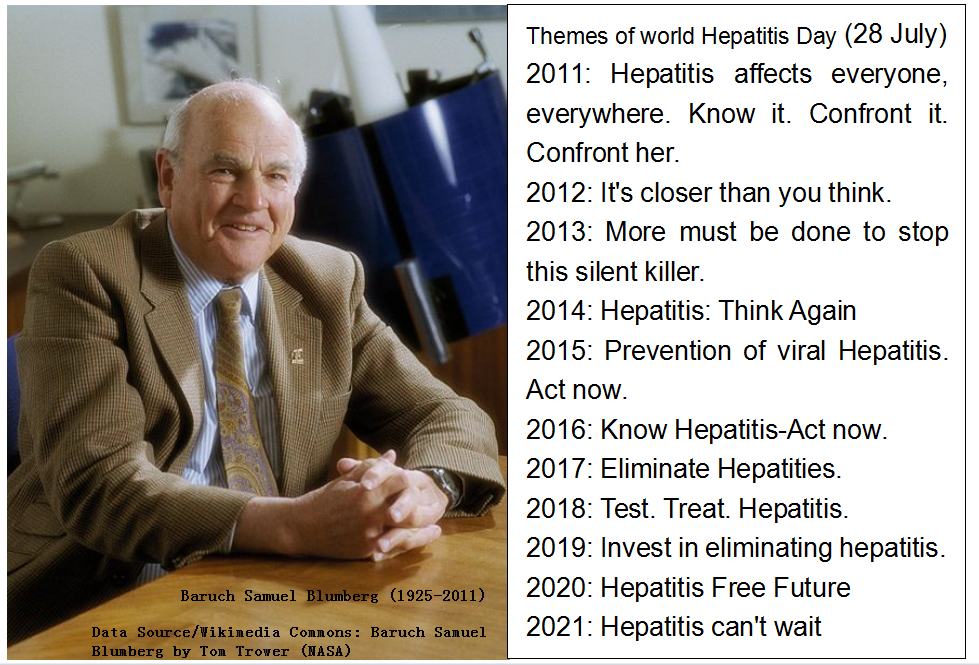
Does hepatitis really have nothing to do with you?
Perhaps the World Health Organization is worried that everyone is only paying attention to COVID-19. In addition to setting the theme of this year’s World Hepatitis Day as “Hepatitis can’t wait”, it also emphasized on its official website:
One person dies from hepatitis-related diseases every 30 seconds, even in the current COVID-19 crisis. We cannot wait. We must take immediate action against viral hepatitis.
Don’t think you must have nothing to do with the hepatitis virus. In the case of hepatitis B virus, which infects the largest number of people, according to WHO estimates, only 10% of infected people know that they have been infected, and only 22% of infected people receive treatment.
The proportion of people who are infected with hepatitis C virus without knowing it and not being treated is even higher because like most people infected with hepatitis B virus, hepatitis C infection can last for decades without symptoms. When diagnosed, the liver is often severely damaged and hard to save.
Although there are currently hepatitis B vaccines that can prevent the occurrence of chronic hepatitis, cirrhosis and liver cancer, there is no hepatitis C vaccine available. Although antiviral drugs can cure more than 95% of hepatitis C-infected patients, thereby preventing the occurrence of cirrhosis and liver cancer, infected people are less likely to receive diagnosis and treatment so that there is no opportunity to use antiviral drugs.
Although the antibodies induced by the hepatitis B vaccine can exert 98%-100% protection against chronic liver disease and liver cancer, there are still a small number of people who do not have antibodies after being vaccinated while those who are lucky enough to produce antibodies often encounter the disappearance of antibodies with age.
According to a study of students in Taipei conducted by National Taiwan University Hospital, 40 percent of those who received all three doses of the vaccine as infants had no detectable hepatitis B antibodies by age 15, and up to 70 percent of them had no detectable hepatitis B antibodies by age 20.
That no antibodies were detected in the body does not mean that the body has no protective power. It may just be that the body’s protective power is reduced, but this fact has reminded us that it is impossible to immunize against hepatitis B virus for life only through the vaccine, not to mention that there is no vaccine for hepatitis C.
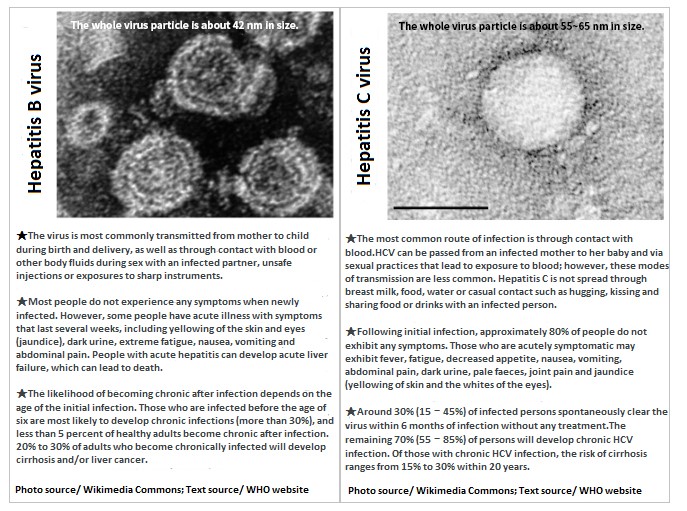
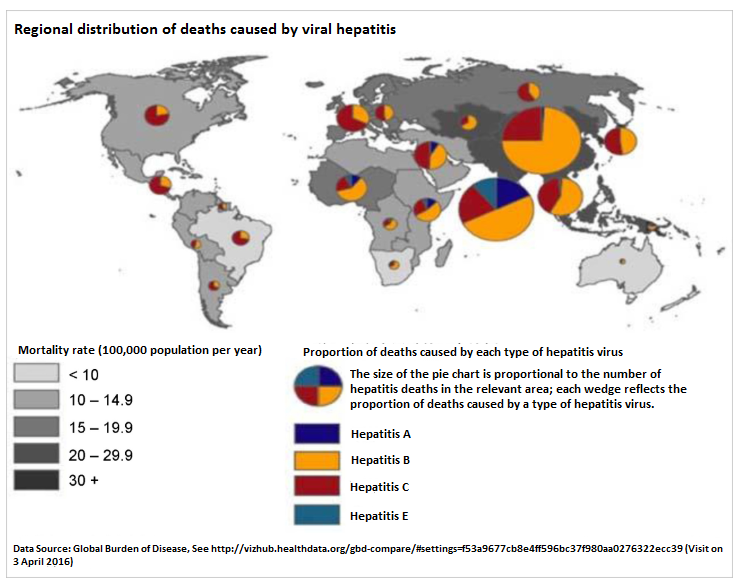
Clinical studies have confirmed that Ganoderma lucidum is effective in treating hepatitis.
Professor Zhibin Lin from Peking University mentioned the effects of Ganoderma lucidum on hepatitis in articles, books and speeches:
Since the 1970s, a large number of clinical reports have pointed out that the total effective rate of Ganoderma preparations in the treatment of hepatitis is 73% to 97%, and the clinical cure rate is 44 to 76.5%.
Ganoderma lucidum alone has a good effect in treating acute hepatitis; Ganoderma lucidum has the effect of enhancing the efficacy of antiviral drugs in the treatment of chronic hepatitis.
In 10 published research reports on viral hepatitis, more than 500 cases of Ganoderma lucidum used alone or in combination with anti-hepatitis virus drugs in the treatment of viral hepatitis have been reported. The curative effects are as follows:
(1) Subjective symptoms such as fatigue, loss of appetite, abdominal distension, and liver pain reduced or disappeared;
(2) Serum ALT returned to normal or decreased;
(3) The enlarged liver and spleen returned to normal or shrank to varying degrees.
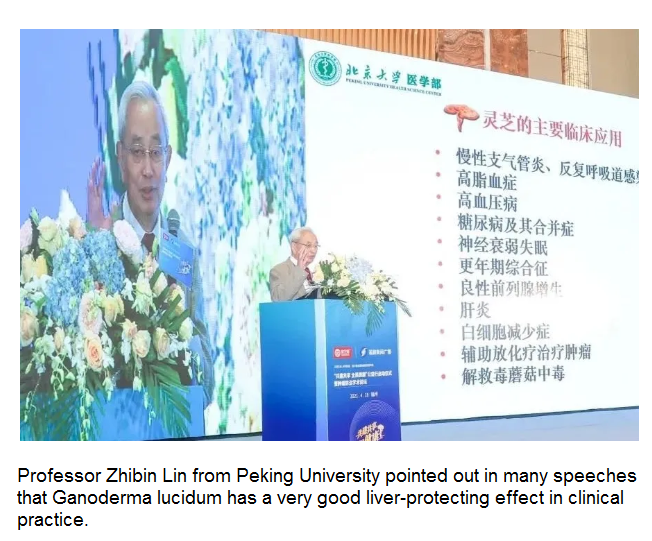
Ganoderma lucidum improves chronic hepatitis.
Zhibin Lin also mentioned many times in his speeches and writings that Ganoderma can be used alone or in combination with western medicine for the treatment of chronic hepatitis:
A clinical report from the People’s Hospital of Jiangyin City, Jiangsu Province confirmed that oral administration of 6 Ganoderma lucidum capsules (including 9 grams of natural Ganoderma lucidum) daily for 1 to 2 months has a better effect than the Xiao Chaihu Tang granules (a commonly used Traditional Chinese medicine) in the treatment of hepatitis B. Regardless of the subjective symptoms, the related indexes, or the number of viruses in the body, the Ganoderma group has improved significantly.
The clinical research conducted by the Second Clinical Medical College of Guangzhou University of Chinese Medicine proved that the one-year period of treatment with Ganoderma lucidum capsules (1.62 grams of Ganoderma lucidum crude drug per day) and Lamivudine (an antiviral drug) has improved the liver function of hepatitis B patients and produced a good antiviral effect.
In addition, a clinical report published in New Medicine by Gao Hongrui et. al. in the Second Hospital of Jilin City in 1985 pointed out that after the use of Ganoderma lucidum tablets (each tablet is equivalent to 1 gram of crude drug) 3 times a day in the treatment of 30 cases of patients with HBsAg positive chronic active hepatitis (aged 6 to 68 years old, with a course of more than 1 to 10 years) for 2 to 3 months,
16 cases were markedly effective (HBsAg negative conversion, liver function returned to normal, symptoms disappeared or improved significantly, liver and spleen retracted), 9 cases were effective (HBsAg titer decreased by 3 times, liver function improved, symptoms improved), and only 3 cases were invalid. The total effective rate is as high as 90%, which once again proves that Ganoderma lucidum itself has a good improvement effect on viral hepatitis.
Ganoderma lucidum improves acute hepatitis.
The clinical practice report published by Zhou Liangmei in Shanxi Medical Journal in 1977 recorded the summary of 32 cases of acute hepatitis treated with spore powder in Pingwang District of Wujiang County – “The curative effect is satisfactory since jaundice disappears in an average of 6 to 7 days and both the disappearance of symptoms such as chest tightness, diarrhea, vomiting, poor appetite and yellow urine and the recovery of liver functions occur within 15-20 days.”
In addition, the author has also interviewed many successful experiences of using Ganoderma lucidum extract to improve chronic hepatitis, acute hepatitis and liver cancer. Among them, I was most impressed by Ms. Zhu who was interviewed in 2009.
She has been growing fruits in Taichung, Taiwan for many years. Before she was about to turn 60, she was diagnosed as a hepatitis B and C carrier with her ALT and AST liver indexes both exceeding 200. Although she took medication immediately, the two liver indexes still soared to around 1,000 within two months from social security drugs to self-funded drugs.
Later, she began to accept the treatment with Ganoderma lucidum preparations (water extract + alcohol extract) and western medicine. At a daily dosage of 27 grams of Ganoderma lucidum, her liver indexes returned to normal in less than two weeks.
Principles of using Ganoderma lucidum to prevent and treat viral hepatitis
Pharmacological studies in the past 40 years have confirmed that Ganoderma lucidum can protect the liver in the following ways:
(1) Improving immunity: Ganoderma lucidum polysaccharides can inhibit the activity and proliferation of hepatitis virus through immune regulation so that patients can quickly recover from illness even if they coexist with the virus.
(2) Protecting liver cells: Almost all hepatitis is related to “a large number of free radicals attacking liver cells”. Ganoderma triterpenes and polysaccharides can enhance the antioxidant capacity of liver cells, effectively remove free radicals and reduce casualties caused by inflammation to protect liver cells.
(3) Promoting the regeneration of liver cells: Ganoderma lucidum polysaccharides can promote the synthesis of protein in the liver and accelerate the regeneration of liver cells.
(4) Prevention and treatment of liver fibrosis: Liver cirrhosis is one of the main causes of death in patients with viral hepatitis, and liver fibrosis is the early stage of liver cirrhosis. Ganoderma lucidum triterpenes and polysaccharides can decompose the formed liver fiber and inhibit the formation of liver fiber. Therefore, eating Ganoderma lucidum early can help prevent the occurrence of liver cirrhosis.
(5) Prevention and treatment of liver cancer: Liver cancer is another major cause of death in patients with viral hepatitis. Ganoderma lucidum triterpenes can inhibit the proliferation and metastasis of liver cancer cells, and Ganoderma lucidum polysaccharides can enhance the anti-cancer ability of the immune system. At the same time, these two major components of Ganoderma lucidum can also enhance the detoxification ability of the liver, thereby exerting a preventive and therapeutic effect on liver cancer.
(6) Reducing fat: Ganoderma lucidum triterpenes and polysaccharides can reduce liver fat (triglyceride) content, reduce liver inflammation, and reduce liver damage caused by improper diet.
(7) Inhibition of hepatitis virus: According to a study published in “Biotechnology Letters” in 2006 by the School of Life Sciences, South China Normal University, Guangzhou, the main triterpene component of Ganoderma lucidum ─ ganoderic acids can effectively inhibit the replication of hepatitis B virus in liver cells and prevent the proliferation of the virus without harming liver cells (as shown in the figure below).
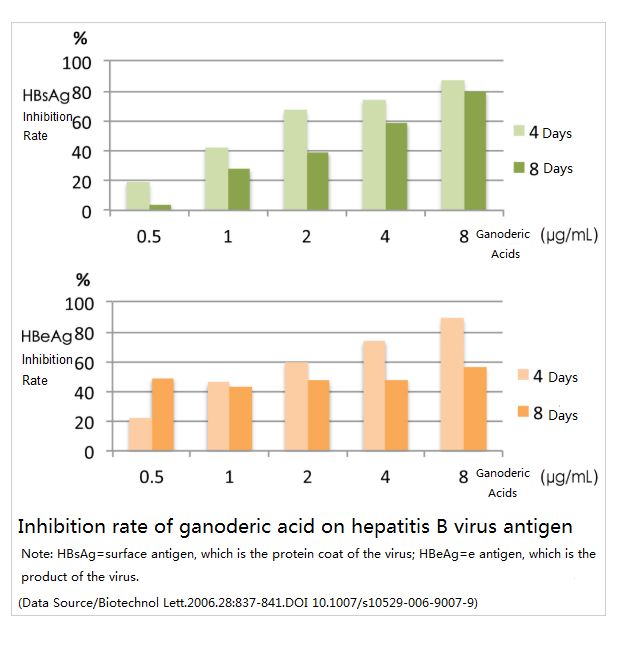
Since the virus will not disappear, please continue to eat Ganoderma lucidum.
In addition to the novel coronavirus and hepatitis virus, we must learn how to live in peace with many other viruses.
Although there is more than one enemy, they all have the same principle of action for the immune system. Therefore, Ganoderma lucidum, which can fight against the hepatitis virus, is actually a weapon against the novel coronavirus.
Although the WHO is determined to eradicate hepatitis, we must admit that neither the hepatitis virus nor the novel coronavirus will disappear from the experience of dealing with the virus for a long time.
In addition to complying with anti-epidemic regulations, medical guidelines and vaccinations, what we can do is to eat more Ganoderma lucidum to keep immunity at a high level. Then no matter what kind of virus is coming, the serious illness becomes milder, the milder illness becomes asymptomatic, and we will have a healthy body at last.
END
About the author/ Ms. Wu Tingyao
Wu Tingyao has been reporting on first-hand Ganoderma lucidum information
since 1999. She is the author of Healing with Ganoderma (published in The People’s Medical Publishing House in April 2017).
★ This article is published under the exclusive authorization of the author, and the ownership belongs to GANOHERB
★ The above works cannot be reproduced, excerpted or used in other ways without the authorization of GanoHerb
★ If the works have been authorized to be used, they should be used within the scope of authorization and indicate the source: GanoHerb
★ Violation of the above statement, GanoHerb will pursue its related legal responsibilities
★ The original text of this article was written in Chinese by Wu Tingyao and translated into English by Alfred Liu. If there is any discrepancy between the translation (English) and the original (Chinese), the original Chinese shall prevail. If readers have any questions, please contact the original author, Ms. Wu Tingyao.

Pass on the Millennia Health Culture
Contribute to Wellness for All



